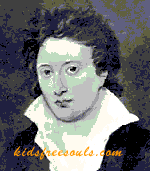
Percy Bysshe Shelley
English poet Percy Bysshe Shelley wrote impassioned, impulsive poems noted for their lyricism and Romanticism. Critics consider Shelley one of the greatest poets of the English language who died in a sailing accident in 1822 shortly before his 30th birthday. August 2 marks the Birthday memories of the poet whose poetry we learnt during our school days and
dive into dreamy oceans of imagination while reciting esp. ‘The Cloud’. I’m sure many kids mug those poetry for Recitation exams or competitions but hardly even care to know anything about the poet. So here I bring Literature columns for you – of coz with Authors & Poets & Famous Personalities. click for the Literaturesection.
Percy Bysshe Shelley
Born on 2nd August 1792, Shelley, Percy Bysshe was an English poet and one of the most influential leaders of the Romantic movement. His beliefs concerning love, marriage, revolution, and politics caused him to be considered a dangerous immoralist by some generation.He was born at Field Place, near Horsham, Sussex, educated at Eton College and, until his expulsion at the end of one year, the University of Oxford. With another student, Thomas Jefferson Hogg, Shelley had written and circulated a pamphlet, The Necessity of Atheism (1811), of which the university authorities disapproved. He had also published a pamphlet of burlesque verse, Posthumous Fragments of Margaret Nicholson (1810).
Shortly after his expulsion, the 19-year-old Shelley married his first wife, Harriet Westbrook, and moved to the Lake District of England to study and write. Two years later, he published his first long serious work, Queen Mab: A Philosophical Poem (1813), a nine-canto mixture of blank verse and lyric measures. The poem was one result of Shelley’s friendship with the British philosopher William Godwin, expressing Godwin’s freethinking Socialist philosophy. Another result of their friendship was Shelley’s relationship with Godwin’s daughter, Mary Wollstonecraft Shelley. In 1814, after separating from his wife, Shelley briefly toured Europe with Mary.Returning to England, he produced the verse allegory Alastor, or The Spirit of Solitude (1816), which anticipated his later important work. During another brief visit to Europe in the summer of 1816, Shelley and Mary met the English poet Lord Byron. At this time, Shelley wrote two short poems, “Hymn to Intellectual Beauty” and “Mont Blanc”. In December 1816, three weeks after the body of his wife, an apparent suicide, was recovered from a lake in a London park, Shelley and Mary were married.
In 1817, Shelley produced Laon and Cythna, a long narrative poem that tells a symbolic tale of revolution. It was later reissued as The Revolt of Islam (1818). At this time, he also wrote revolutionary political tracts signed “The Hermit of Marlow”. Then, early in 1818, he and his new wife left England for the last time.
During the remaining four years of his life, Shelley produced all his major works. Traveling and living in various Italian cities, the Shelleys were friendly with the English poet Leigh Hunt and his family as well as with Byron. Shortly before his 30th birthday, Shelley was drowned (1822) in a storm while attempting to sail from Leghorn to La Spezia, Italy. Ten days later, his body was washed ashore.
Many critics regard Shelley as one of the greatest of all English poets. They point especially to his lyrics, including the familiar short odes “To a Skylark” (1820), “Ode to the West Wind” (1819), and “The Cloud” (1820). Also greatly admired are the shorter love lyrics, including “I Arise from Dreams of Thee” and “To Constantia Singing”; the sonnet “Ozymandias” (1818); and “Adonais” (1821), an elegy for the British poet John Keats, written in formal Spenserian stanzas. The effortless lyricism of these works is also evident in Shelley’s verse dramas, The Cenci (1819), a tragedy based on a case of incestuous rape and patricide in 16th-century Rome, and Prometheus Unbound (1820); these remain, however, profound but un-produceable closet dramas. His prose, including a translation (1818) of The Symposium by Plato and the unfinished critical work In Defence of Poetry (1822), is equally skilful. Other critics, particularly anti-Romanticists who object to the prettiness and sentimentality of much of his work, maintain that Shelley was not as influential as the other British Romantic poets: Byron, Keats, or William Wordsworth.
The Cloud by Percy B. Shelley
I bring fresh showers for the thirsting flowers,
From the seas and the streams;
I bear light shade for the leaves when laid
In their noon-day dreams.
From my wings are shaken the dews that waken
The sweet buds every one,
When rocked to rest on their mother’s breast,
As she dances about the Sun.
I wield the flail of the lashing hail,
And whiten the green plains under,
And then again I dissolve it in rain,
And laugh as I pass in thunder.
I sift the snow on the mountains below,
And their great pines groan aghast;
And all the night ’tis my pillow white,
While I sleep in the arms of the blast.
Sublime on the towers of my skier bowers,
Lightning my pilot sits;
In a cavern under is fettered the thunder,
It struggles and howls at fits;
Over Earth and Ocean, with gentle motion,
This pilot is guiding me,
Lured by the love of the genii that move
In the depths of the purple sea;
Over the rills, and the crags, and the hills,
Over the lakes and the plains,
Wherever he dream, under mountain or stream,
The Spirit he loves remains;
And I all the while bask in Heaven’s blue smile,
Whilst he is dissolving in rains.
The sanguine Sunrise, with his meteor eyes,
And his burning plumes outspread,
Leaps on the back of my sailing rack,
When the morning star shines dead;
As on the jag of a mountain crag,
Which an earthquake rocks and swings,
An eagle alit one moment may sit
In the light of its golden wings.
And when Sunset may breathe, from the lit Sea beneath,
Its ardors of rest and of love,
And the crimson pall of eve may fall
From the depth of Heaven above,
With wings folded I rest, on mine aerie nest,
As still as a brooding dove.
That orbed maiden with white fire laden
Whom mortals call the Moon,
Glides glimmering o’er my fleece-like floor
By the midnight breezes strewn;
And wherever the beat of her unseen feet,
Which only the angels hear,
May have broken the woof, of my tent’s thin roof,
The stars peep behind her, and peer;
And I laugh to see them whirl and flee,
Like a swarm of golden bees,
When I widen the rent in my wind-built tent,
Till the calm rivers, lakes, and seas,
Like strips of the sky fallen through me on high,
Are each paved with the moon and these.
I bind the Sun’s throne with a burning zone
And the Moon’s with a girdle of pearl;
The volcanoes are dim and the stars reel and swim
When the whirlwinds my banner unfurl.
From cape to cape, with a bridge-like shape,
Over a torrent sea,
Sunbeam-proof, I hang like a roof
The mountains its columns be!
The triumphal arch, through which I march
With hurricane, fire, and snow,
When the Powers of the Air, are chained to my chair,
Is the million-colored Bow;
The sphere-fire above its soft colors wove
While the moist Earth was laughing below.
I am the daughter of Earth and Water,
And the nursling of the Sky;
I pass through the pores, of the ocean and shores;
I change, but I cannot die
For after the rain, when with never a stain
The pavilion of Heaven is bare,
And the winds and sunbeams, with their convex gleams,
Build up the blue dome of Air
I silently laugh at my own cenotaph
And out of the caverns of rain,
Like a child from the womb, live a ghost from the tomb,
I arise, and unbind it again.
Ode to a Skylark
by Percy Bysshe Shelley
Hail to thee, blithe Spirit!
Bird thou never wert –
That from Heaven or near itor near it
Pourest thy full heart
In profuse strains of unpremeditated art.
Higher still and higher
From the earth thou springest,
Like a cloud of fire;
The blue deep thou wingest,
And singing still dost soar, and soaring ever singest.
In the golden lightning
Of the sunken sun,
O’er which clouds are bright’ning,
Thou dost float and run,
Like an unbodied joy whose race is just begun.
The pale purple even
Melts around thy flight;
Like a star of Heaven,
In the broad daylight
Thou art unseen, but yet I hear thy shrill delight –
Keen as are the arrows
Of that silver sphere
Whose intense lamp narrows
In the white dawn clear,
Until we hardly see, we feel that it is there.
All the earth and air
With thy voice is loud,
As, when night is bare,
From one lonely cloud
The moon rains out her beams, and Heaven is overflowed.
What thou art we know not;
What is most like thee?
From rainbow clouds there flow not
Drops so bright to see,
As from thy presence showers a rain of melody: –
Like a Poet hidden
In the light of thought,
Singing hymns unbidden,
Till the world is wrought
To sympathy with hopes and fears it heeded not:
Like a high-born maiden
In a palace-tower,
Soothing her love-laden
Soul in secret hour
With music sweet as love, which overflows her bower:
Like a glow-worm golden
In a dell of dew,
Scattering unbeholden
Its aërial hue
Among the flowers and grass which screen it from the view:
Like a rose embowered
In its own green leaves,
By warm winds deflowered,
Till the scent it gives
Makes faint with too much sweet these heavy-wingéd thieves:
Sound of vernal showers
On the twinkling grass,
Rain-awakened flowers –
All that ever was
Joyous and clear and fresh – thy music doth surpass.
Teach us, Sprite or Bird,
What sweet thoughts are thine:
I have never heard
Praise of love or wine
That panted forth a flood of rapture so divine.
Chorus hymeneal,
Or triumphal chant,
Matched with thine would be all
but an empty vaunt –
A thing wherein we feel there is some hidden want.
What objects are the fountains
Of thy happy strain?
What fields, or waves, or mountains?
What shapes of sky or plain?
What love of thine own kind? what ignorance of pain?
With thy clear keen joyance
Languor cannot be:
Shadow of annoyance
Never came near thee:
Thou lovest, but ne’er knew love’s sad satiety.
Waking or asleep,
Thou of death must deem
Things more true and deep
Than we mortals dream,
Or how could thy notes flow in such a crystal stream?
We look before and after,
And pine for what is not:
Our sincerest laughter
With some pain is fraught;
Our sweetest songs are those that tell of saddest thought.
Yet, if we could scorn
Hate and pride and fear,
If we were things born
Not to shed a tear,
I know not how thy joy we ever should come near.
Better than all measures
Of delightful sound,
Better than all treasures
That in books are found,
Thy skill to poet were, thou scorner of the ground!
Teach me half the gladness
That thy brain must know;
Such harmonious madness
From my lips would flow,
The world should listen then, as I am listening now.







